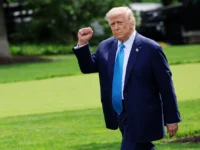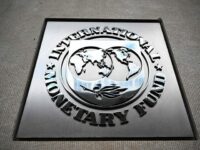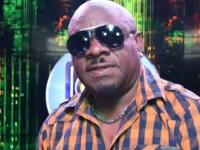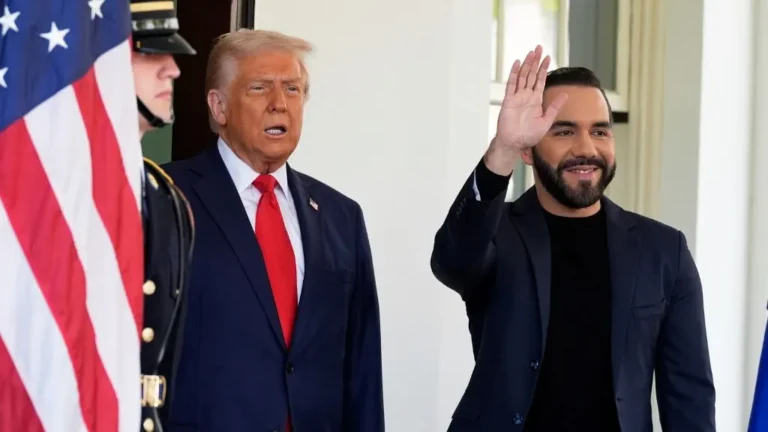President Bukele Rejects U.S. Request to Return Wrongly Deported Maryland Man
Washington, D.C. – In a highly controversial move, El Salvador’s President Nayib Bukele declared he will not return a Maryland man who was mistakenly deported to El Salvador, despite a U.S. Supreme Court directive encouraging his repatriation. The man, Kilmar Abrego Garcia, was sent to a high-security gang prison upon arrival, sparking legal and diplomatic tensions between the two nations.
Bukele Calls U.S. Request “Preposterous”
During a joint appearance at the White House, President Bukele dismissed the idea of sending Abrego Garcia back to the U.S., stating, “How can I smuggle a terrorist into the United States?” He emphasized that El Salvador has no legal obligation to return him and referred to the U.S. request as “preposterous.”
Abrego Garcia, who has been accused by U.S. immigration authorities of gang affiliation, had an active court order preventing deportation due to threats from violent criminal organizations. His legal team now seeks a court order to force the U.S. government to explain its refusal to comply with the Supreme Court’s guidance.
Trump Administration Doubles Down on Deportation Policies
Former President Donald Trump and his top advisers remain firm in their stance. White House Deputy Chief of Staff Stephen Miller stated, “He’s a citizen of El Salvador. It’s arrogant to suggest we tell another country how to deal with its citizens.”
Attorney General Pam Bondi reinforced the claim that Abrego Garcia was illegally in the country and had ties to the MS-13 gang—an accusation based solely on a confidential informant’s testimony. His lawyers counter that no credible evidence supports the allegation.
U.S. and El Salvador’s Complex Deportation Partnership
The case highlights the deeper collaboration between the U.S. and El Salvador on immigration and deportation efforts. Since March, El Salvador has accepted over 200 Venezuelan migrants accused by the U.S. of gang involvement, placing them in a newly constructed, maximum-security prison near San Salvador.
The prison, part of Bukele’s sweeping anti-gang initiative, now holds more than 84,000 individuals. This crackdown has been met with both domestic praise and international criticism, as the country continues to operate under a state of emergency that suspends certain civil liberties.
Trump’s Proposal: Send U.S. Criminals to El Salvador
In a surprising twist, Trump also suggested that U.S. citizens convicted of violent crimes be incarcerated in El Salvador. “We can do things with the president for less money and have great security,” Trump stated, adding that Bukele would need to build more prisons to accommodate them.
While legally dubious, the proposal reflects a broader effort to shift incarceration costs and responsibilities abroad—particularly to countries with authoritarian-leaning governments amenable to such deals.
Supreme Court Pushes for Repatriation
The Supreme Court has made it clear: Abrego Garcia’s return should be “facilitated.” Yet, the Trump administration has thus far ignored the ruling. Trump recently hinted he would comply if explicitly ordered by the justices but has not taken any definitive action.
Meanwhile, legal proceedings continue. Federal Judge Paula Xinis is reviewing motions that could hold the U.S. government in contempt for its noncompliance.
Strained Relations Under Biden Administration
Although Bukele had a cooperative relationship with Trump, his rapport with the Biden administration has been far rockier. Washington has expressed concern over Bukele’s authoritarian leanings and erosion of democratic institutions.
Nonetheless, the State Department recently upgraded El Salvador’s travel advisory to Level 1—indicating a low-risk destination for U.S. travelers—citing the dramatic drop in gang violence and homicides.
Final Thoughts: Legal and Diplomatic Showdown Ahead
As the U.S. and El Salvador dig in on opposite sides of Abrego Garcia’s case, the legal and diplomatic standoff raises questions about sovereignty, international law, and human rights. Whether the Biden administration will escalate the issue—or if the courts will intervene more forcefully—remains to be seen.


















